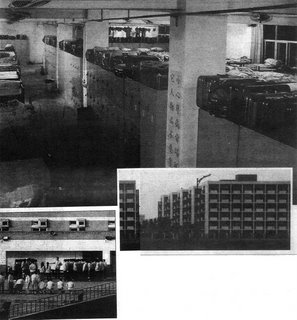iPod City: Apple criticized for factory conditions

If you are fortunate enough to live in the UK, you may have seen an interesting piece in the Mail on Sunday this past weekend. The Mail sent some reporters to Longhua, China (twenty minutes from Hong Kong) and Suzhou, which borders Shanghai to visit two factories which bring forth the iPods, Nanos, and Shuffles that are "designed in California" and tremendously popular around the world. There they found conditions that to our Western ears sound positively Dickensian.
"We have to work too hard and I am always tired. It's like being in the army. They make us stand still for hours. If we move, we are punished by being made to stand still for longer…We have to work overtime if we are told to and can only go back to the dormitories when our boss gives us permission…If they ask for overtime we must do it. After working 15 hours until 11:30pm, we feel so tired."
The first facility, run by Taiwanese company Foxconn, is described as "the original and largest plant to be built in mainland China. It's a sprawling place where 200,000 people work and sleep." Many are already questioning this figure as being an error of some sort, as that would basically be a city the size of Tallahassee, Florida. It is worth noting, however, that the Foxconn facility produces electronics equipment for a variety of IT companies besides Apple, and the Longhua facility holds one-fifth of their "million-strong workforce." iPod Nanos are produced in a five-story factory at the facility, stationed with police officers who check everyone who enters and leaves to "thwart rivals intent on industrial espionage." For 15 hour workdays, pay at this facility is approximately US$50 per month.
The Mail on Sunday's pictures of "iPod City"
Image source: The Mail on Sunday (click for enlargement).
The second facility visited benefited from its proximity to Shanghai. Dormitories are outside the plant, work is only 12 hours of the day, and pay is almost US$100 per month (the security guards who watch over the workers earn up to US$150), of which up to half is paid back to the company for housing and food. The remainder is typically sent home to families, many of which are struggling to bring in that kind of money farming.
Given that the iPod nano components cost approximately US$75 but have around 400 parts, cheap labor becomes very important at keeping the price competitive. One guard at one of the facilities visited understood this:
"Payment is lower because the boss wants to reduce our costs," he says. "Prices need to be competitive to get orders from abroad."
What results is an unpleasant catch-22. Overseas companies need to keep their costs down so first-world consumers can afford their products and they can stay in business. In places like China, the low wages and shocking conditions present an opportunity not unlike what came of the Industrial Revolution.
James Kynge, author of China Shakes The World, argues that despite Westerners' perceptions about working conditions in factories, the wages are a godsend that are transforming rural China. "The money sent back to farming families from the workers now exceeds the amount made from agriculture," he says.
Further, China has no unions, which allows subcontractors like Foxconn to keep wages artificially low.
Workers will be lucky if they make two percent of the profit from an iPod. Foxconn will make less than ten percent. Far more money is spent by Apple on marketing the product than making it.
That's not to say something can't or shouldn't be done. A recent BusinessWeek article profiles a Hewlett-Packard manager whose job is specifically to fight for "Supply Chain Social & Environmental Responsibility." Bonny Nixon-Gardiner not only travels to facilities like the Foxconn Longhua plant to ensure the working conditions are decent, but she has also worked with other companies such as Dell, IBM, and Intel to create the Electronic Industry Code of Conduct, setting out basic labor and environmental standards for IT contractors.
It's not an easy job. Grover Thurman of Foxconn describes working with Nixon-Gardiner as "like being kissed and slapped at the same time. It can make you psychotic—but it needs to be done."
We can only hope that Apple, who puts at least a little of that marketing budget into trying to promote themselves as a socially responsible company, can get on board with the movement towards technology manufacturing ethics.
Of course, Apple isn't alone in its use of labor in Asia, including that which has been profiled here. We hope that all such companies keep the improvement of workers' conditions at the top of their "must have" feature list for the future.

0 Comments:
Post a Comment
Subscribe to Post Comments [Atom]
<< Home